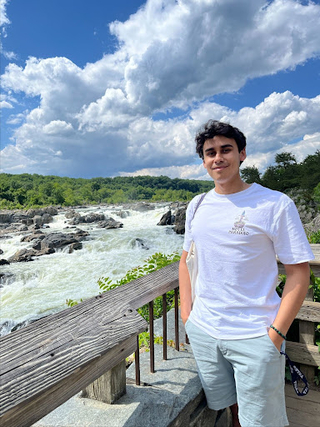Diego Bolanos ('25)

When Diego (he/him) arrived at Yale, he had a fairly narrow view of the education system. Until then, he had only ever attended public schools in the United States and was unfamiliar with the vast range of educational experiences of his peers. It was this realization which sparked his interest in the field, eventually leading him to join EDST’s intensive certificate program alongside his English major.
Now a senior in Saybrook, Diego is hoping to shed light on some of these varied experiences. Specifically, his project seeks to make visible the stories of low income, international students attending Yale. “Low income international students in the U.S. are underrepresented, and also very unspoken for in research,” he says, “They are a very small community (only 10% of students at Yale come from abroad), but more colleges are making an effort to bring them in.”
When Diego first began considering the international student community on campus, he encountered a common assumption—that all international students came from wealthy backgrounds. For him, this contrasted starkly with the reality of some of his peers, who not only came from economically disadvantaged backgrounds but also struggled to access resources, precisely because of the misconception that they didn’t need them.
In line with this, Diego has observed a significant gap between resources available to international students and those designed for first-generation, low-income (FGLI) students. He hopes his project will address this by making university administrators aware of how existing support systems for low-income domestic students can be expanded to better serve international students as well. “Yale has the resources to make that experience more comfortable, but they’ve been largely inaccessible to low-income international students,” Diego explains.
When asked about the most enjoyable part of the process, Diego shared that he’s been able to connect with people at Yale, particularly in the Office of International Students and Scholars (OISS), who he would’ve never thought to speak with had it not been for the recommendations of his advisors. He also expressed deep gratitude for the capstone class and the valuable feedback he’s received from his peer mentoring group. He recalls feeling uncertain about what he wanted to focus on early on in the process, but being able to find a niche that truly excited him with guidance from Professor TZB, Dr. Debs, and the larger community of scholars.
Reflecting on the program in his final semester, Diego feels that the Education Studies program does a great job highlighting both the progress being made in the field and the ongoing inequalities. He holds “not a negative view of the field, per se, but a more realistic one.” Throughout his time at Yale, Diego has expanded his understanding of what it means to be at a place like this, acknowledging that despite the availability of financial aid, the institution remains fairly restrictive. He believes there’s still much to be done to make the community more accessible, and while there is space for everyone who gets to Yale, the necessary resources must also be made more available for those already in the community.